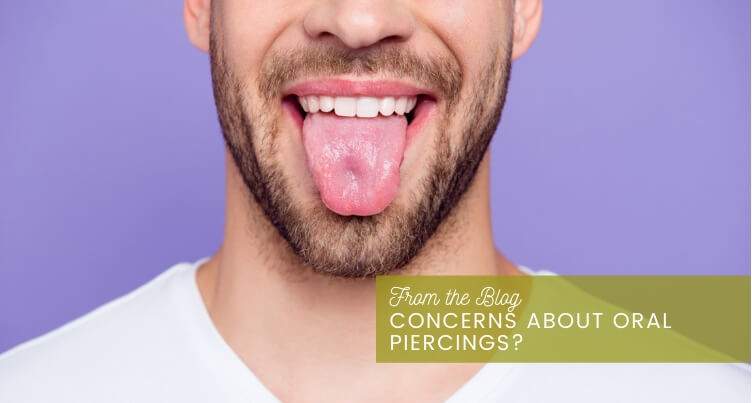
Body piercing has been a popular form of expression. Roman soldiers pierced their nipples. Egyptian pharaohs pierced their navels. These days, the most common are ear piercings.
But since the late 1980s there has been a growing interest in oral piercings. This includes the tongue, lips and cheek. However, piercing in and around your mouth is far more risky than your ears. Your mouth is warm, moist and the home of millions of bacteria.
Do you have trouble remembering regularly to brush and floss? Beware that oral piercings increase the need for meticulous oral hygiene. Here are some things to consider.
Initial Procedure Complications
Infection from the procedure is the most common. Which can be life threatening if your tongue swells and blocks your ability to breathe.
Pain, bruising and tenderness are common.
It’s not uncommon to experience numbness after the procedure. It’s often temporary, but sometimes it can be permanent. Lasting nerve injury can affect your ability to taste food and speak normally.
Expect prolonged bleeding if a blood vessel is punctured. Mouth bleeding is serious and especially difficult to control. This can result in a medical emergency.
The wound may permit bacteria to enter the bloodstream and reach your heart. The resulting heart valve inflammation is known as endocarditis.
Post-operative Complications
Be mindful of swelling, chills or a red-streaked appearance around the piercing.
Keep the piercing site clean by using a mouth rinse after every meal.
Long-term Complications
Using your tongue to “play” with the piercing can injure gums and damage fillings. This can also produce cracked or sensitive teeth.
Allergic reactions to metal have been reported. These can show up as skin rashes or a hypersensitivity and inflammation.
A tongue piercing can produce increased saliva production. Excessive saliva can produce drooling and make speech difficult.
Swallowing the jewelry or even choking has been reported. Be sure to regularly check the tightness of your piercing to prevent it from becoming dislodged.
Caps, crowns and other restorations can become damaged with repeated contact with oral jewelry.
Already have an oral piercing? Daily brushing and flossing will be more important than ever. Be sure to contact us immediately if you notice the slightest sign of infection.

